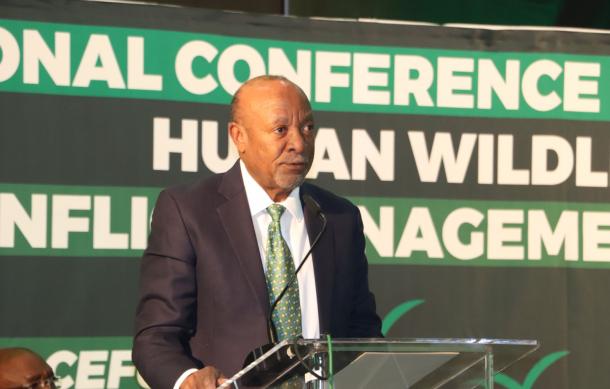
Human-wildlife conflict should not be considered the responsibility of the government alone; all citizens and state agencies should work to minimise the losses and impact of wild animals on human communities.
These were the words of Vice President Nangolo Mbumba when he opened the National Human-Wildlife Conflict Conference in Windhoek.
Mbumba says there is a need to manage human-wildlife conflict in a way that recognises the rights of local communities, promotes biodiversity conservation, and ensures that decision-making is quick and based on the best available information.
In order to achieve this, he says there is a need to develop appropriate mitigation and monitoring methods and for stakeholders to be effectively capacitated to effectively manage instances of human-wildlife conflict.
"I, therefore, call upon this National Conference to review and discuss progress, challenges, and opportunities in the implementation of this policy so that we may have specific resolutions and actions to implement specific preventative, protective, and mitigation strategies for human-wildlife conflict management."
Mbumba says the Ministry of Environment, Forestry, and Tourism continues to receive several requests for compensation for damages caused by wildlife to human lives and property, including livestock and crops.
"This indicates that there is a serious need to reduce the growing tension around human-wildlife conflicts, as losses of human lives, livestock, and crops, as well as damage to infrastructure that affects the livelihoods of our citizens, cannot continue to be tolerated. This conference should investigate and establish mechanisms that would provide compensation to affected parties whose family members die or are severely injured as a result of human-wildlife conflict."
According to the Environment, Forestry, and Tourism Minister, Pohamba Shifeta, the conference is expected to review the Revised National Policy on HWC Management launched in 2018.
"We believe more has been done in the implementation of this policy and in putting mitigation and preventative measures in place to manage human-wildlife conflict. We also recognise that a lot still has to be done. The scale and urgency of the problem required the government to develop an integrated, flexible, and comprehensive policy towards dealing with human-wildlife conflict that can provide a framework for all stakeholders and can meet the country's national and international commitments to biodiversity conservation while taking into account the rights and development needs of its people."
Also speaking at the conference was Khomas Governor Laura Mcloed-Katjirua. "Your presence in this conference demonstrates the importance that you attach to the issue of human-wildlife conflict in our country."
The three-day National Human-Wildlife Conflict Conference is attended by regional governors, NGOs, line ministries, civil society organisations, and conservancies, among others.





